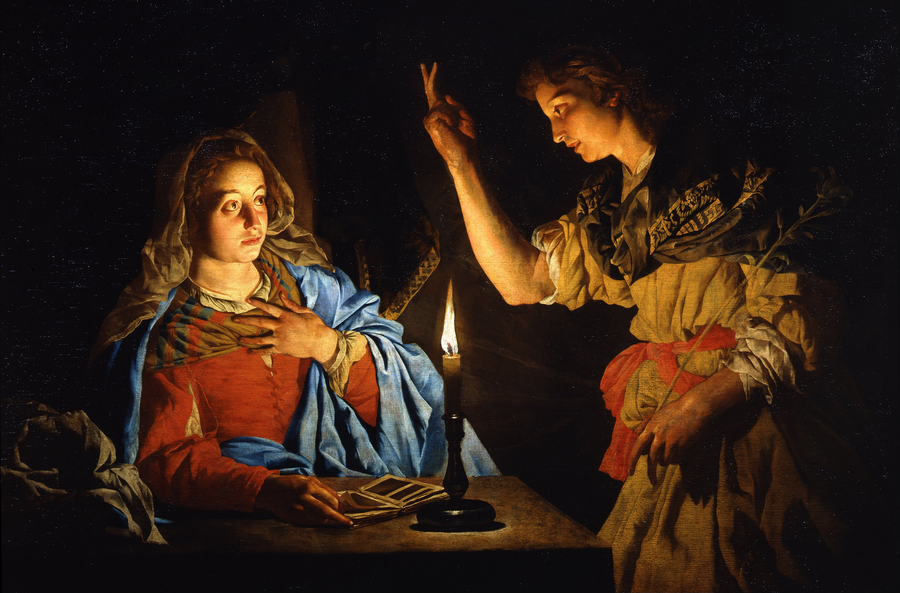
Editor’s note: The following comprises the second chapter, first part, of The Gospel of Luke: An Exposition, by Charles R. Erdman (published 1936). All spelling in the original.
II. The Birth and Childhood of Jesus
A. The Birth of John Foretold (Luke 1:5-25)
__________________________________________________________________________________________
5 There was in the days of Herod, king of Judæa, a certain priest named Zacharias, of the course of Abijah: and he had a wife of the daughters of Aaron, and her name was Elisabeth. 6 And they were both righteous before God, walking in all the commandments and ordinances of the Lord blameless. 7 And they had no child, because that Elisabeth was barren, and they both were now well stricken in years.
8 Now it came to pass, while he executed the priest’s office before God in the order of his course, 9 according to the custom of the priest’s office, his lot was to enter into the temple of the Lord and burn incense. 10 And the whole multitude of the people were praying without at the hour of incense. 11 And there appeared unto him an angel of the Lord standing on the right side of the altar of incense. 12 And Zacharias was troubled when he saw him, and fear fell upon him. 13 But the angel said unto him, Fear not, Zacharias: because thy supplication is heard, and thy wife Elisabeth shall bear thee a son, and thou shalt call his name John. 14 And thou shalt have joy and gladness; and many shall rejoice at his birth. 15 For he shall be great in the sight of the Lord, and he shall drink no wine nor strong drink; and he shall be filled with the Holy Spirit, even from his mother’s womb. 16 And many of the children of Israel shall he turn unto the Lord their God. 17 And he shall go before his face in the spirit and power of Elijah, to turn the hearts of the fathers to the children, and the disobedient to walk in the wisdom of the just; to make ready for the Lord a people prepared for him. 18 And Zacharias said unto the angel, Whereby shall I know this? for I am an old man, and my wife well stricken in years. 19 And the angel answering said unto him, I am Gabriel, that stand in the presence of God; and I was sent to speak unto thee, and to bring thee these good tidings. 20 And behold, thou shalt be silent and not able to speak, until the day that these things shall come to pass, because thou believedst not my words, which shall be fulfilled in their season. 21 And the people were waiting for Zacharias, and they marvelled [pg 020] while he tarried in the temple. 22 And when he came out, he could not speak unto them: and they perceived that he had seen a vision in the temple: and he continued making signs unto them, and remained dumb. 23 And it came to pass, when the days of his ministration were fulfilled, he departed unto his house.
24 And after these days Elisabeth his wife conceived; and she hid herself five months, saying, 25 Thus hath the Lord done unto me in the days wherein he looked upon me, to take away my reproach among men.
_________________________________________________________________________________________
Luke is the gospel of gladness, of praise, and of prayer, of tender, human interest, and of heavenly grace. It is fitting, therefore, that the narrative should open with a scene in the Temple at the hour of incense and with a divine promise which fills a heart with rapturous joy. This promise concerns the birth of one who is to prepare the way for the ministry of Christ, and this ministry forms the sum and substance of the gospel story.
The time was “in the days of Herod,” called “the Great,” a monster of cruelty, a vassal of Rome, who ruled the Jews with savage tyranny. The political slavery of the people was only less pitiful than their spiritual decline, for religion had become an empty form, a mere system of ceremonies and rites. However, God is never without his witnesses and his true worshipers. Among these were “a certain priest named Zacharias” and his wife Elisabeth, who lived in the hill country of Judea, south of Jerusalem. They “were both righteous before God,” not sinless but without reproach, carefully observing the moral and also the ritual requirements of the law. Yet godliness is no guarantee against sorrow or against the disappointment of human hopes, and these pious souls were saddened because their home was childless. This trial was peculiarly great among a people who regarded childlessness as a sign of divine displeasure and it was even more distressing to the hearts of the faithful who were yearning for the birth of the promised Messiah.
Twice each year Zacharias went to Jerusalem to perform for a week his sacred tasks. Finally there came to him a privilege which a priest could enjoy only once in his lifetime; the “lot” fell upon him, and he thus was chosen to enter the Holy Place at the hour of prayer and there offer incense upon the golden altar just before the veil in the very presence of God. It was the supreme hour of his life. As the cloud of perfume began to rise, true symbol of accepted petitions, an angel appeared and assured the startled priest that his supplications had been heard. For what had Zacharias then been praying—for a son, or for the salvation of his people? Were not both desires included in that supplication? As the representative of a nation, the priest hardly could have confined his petition to what was purely personal and private. Yet, as he pleaded for the coming of the Messiah, there must have been in his soul the secret yearning of the long years or the memory of that abandoned hope which he had always associated in thought with the salvation of Israel. Many a minister of Christ has a similar experience; in the very performance of his public tasks there rests on his soul the conscious shadow of some private grief.
The angel declared that the prayer for national salvation had been heard, and he gradually unfolded the contents of the divine answer; the Messiah was about to appear, and his coming was to be heralded by a son who was to be born to the aged priest. The angel spoke with great definiteness: the child would be named John; many would rejoice at his birth; he would be a Nazirite, and as such would take the vow of total abstinence from wine and of complete dedication to God; as a consequence of this dedication he would be filled with the divine Spirit and thus enabled to lead his people to repentance. He would labor in the spirit and power of Elijah, calling men to lives of natural affection and justice and preparing them for the salvation which Christ would bring.
So surprising a message was too great to be credited at once by the wondering priest. He had ceased to hope that the longing of his heart could be fulfilled. He therefore asked for a sign by which he might be assured that the blessed promise was true. The angel replied with a statement of his own majestic power and the glory of his mission and he granted to Zacharias a sign. This sign was at once a rebuke and a blessing. It rebuked the unbelief of the aged priest, yet it strengthened his faith. He was smitten with dumbness which was to continue until the promise of the angel had been realized. Zacharias would not accept the word of the Lord; he would not praise him for his goodness and his grace. Therefore, his tongue was to be silent and he was to be unable to speak until at last his lips were opened in glad thanksgiving. Unbelief is never joyous; infidelity has no songs.
However, the sign suggests supernatural power. The faith of Zacharias and also of Elisabeth will be strengthened by the very silence in their home. So when the people in the court of the Temple waited for the priest to reappear, when as he came they still waited for the usual benediction, when they found that Zacharias had been stricken with dumbness, they concluded he had seen a vision in the Temple, and he himself was assured that the messenger had come from God. In due time the promise was fulfilled; a new life came into being. Meanwhile, until it would be evident that her “reproach” for childlessness had been taken away, Elisabeth lived in strict retirement. She would not have others, by seeing her, think that she was under divine displeasure at the very time when she secretly knew that she was a special recipient of divine grace. She was jealous for the glory of her God; she delighted in her hidden fellowship with him. From the homes of such priests who can pray, and of such hearts which can trust, there ever have been coming the great prophets of the Lord.
(Go back to previous chapter)
(Continue to next chapter)









